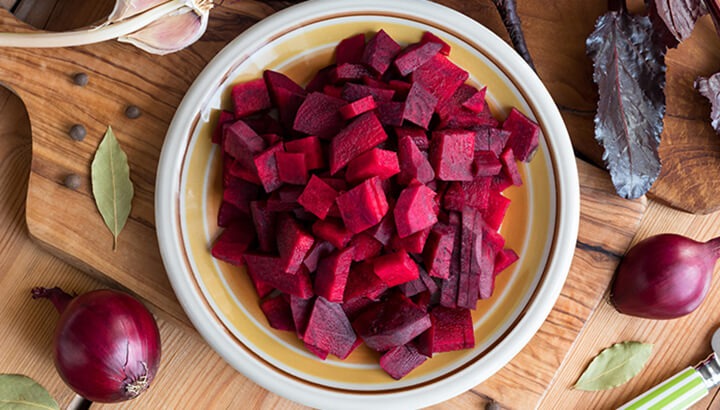Did you hear about the guy who stopped eating vegetables? His heart missed a beet. Sorry… vegetarian joke.
Perhaps my pun is a little undercooked, but a new study suggests that the heart-healthy benefits of this much-neglected vegetable are no laughing matter. I’d like to discuss some of these findings in a moment (and what they could mean for your health), but first, a few additional reasons why you should consider adding more beets to your diet.
The benefits of beets
Nutritionists have long recognized that beets are chock full antioxidants, phytonutrients, and essential minerals. Other forms of goodness include a unique type of insoluble fiber (found only in beets), vitamin C, folic acid (vitamin B9), as well potassium and magnesium.
But there are even more health-boosting compounds in beets including a plant pigment called betacyanin (which is responsible for the beet’s deep purplish-red color), betaine (an amino acid that counteracts inflammation), and nitric acid (unlike nitrates found in deli meats, this vegetable form is entirely healthy).
With all this good stuff, it’s no wonder that studies have found that beets:
- Help improve liver detoxification chemistry.
- Lower blood pressure.
- Protect against cancer.
- Improve brain function.
Why beets are so heart-healthy
The beneficial ingredients in beets are so powerful that many endurance athletes make sure to eat lots of them before a competition in order to bolster their energy reserves. The research bears this out. A 2009 study found that the nitrates in beets enhanced stamina in cyclists by as much as 15 percent. But increasing oxygen uptake is only one of the heart-healthy benefits this vegetable provides:
- The body converts the nitrates found in beets into nitric oxide, which dilates blood vessels and reduces inflammation. This reduces blood pressure, discourages clotting and improves the efficiency of your circulatory system.
- Folate and betaine in beets work synergistically to lower the levels of homocysteine in the blood, which has been linked to arterial damage and heart disease.
- A number of studies have found that beet consumption raises the presence of detoxifying enzymes in the bloodstream. The insoluble fiber in beets also helps to lower levels of triglycerides and cholesterol.
A 2018 study, which was just recently published in the Journal of Cardiac Failure, adds further confirmation to what we already know about the heart-healthy benefits of beets. Here, researchers at Indiana University found that the nitrates in beet juice increased the exercise capacity of patients suffering from heart failure.
This is extremely welcome news because many cardiac patients are faced with a Catch-22 because their diminished aerobic capacity prevents them from engaging in the sustained exercise and activities that can help them improve their heart health, which increases their quality of life while bolstering survival rates.
Takeaway
Many people do not have a great relationship with beets. If that sounds familiar, it might be because they were forced upon you as child, overcooked, canned, pickled, or in a Polish soup (borscht) that does not have a kid-friendly appeal. It’s a shame because beets are delicious, easy to prepare, and super heart healthy. You’d do well to improve your relationship with them.
Admittedly, beet juice is something of an acquired taste and most people seem to either love it or hate it. But it’s increasingly easy to find it on supermarket shelves as people have become more aware of how this natural drink helps boost energy, assist in liver detoxification, and improve circulation.
Beet juice is a popular way of deriving the benefits of the Beta vulgaris plant and this method does tend to offer a more concentrated amount of nutrients than serving cooked beets. But that should not dissuade you from trying beets in some stovetop or oven-baked recipes too. Beets are versatile — they can be boiled, baked, roasted, juiced, or even served raw. Here are a few quick ways you can prepare them:
- Roast them. Peel and slice beets into bite-sized chunks. Lightly coat with olive oil and salt and roast at 450 until tender. Shake the tray every 15-20 minutes during cooking. They can also be roasted together with other root vegetables like carrots, parsnips, turnips, onions, and potatoes.
- Eat them raw. Peel off the skin, before cutting the beets into thin slices. Add chile spice or a hint of lemon for a delicious raw snack. You can also add sliced or shredded beets to salads.
- Bake them. Preheat your oven to 375 degrees Fahrenheit. Next, lightly coat peeled beets with olive oil and season to taste with sea salt and black pepper. Wrap the beets in aluminum foil, place on an oven tray, and cook for 45 to 50 minutes.
- Boil or steam them. Place whole beets in beets in a large saucepan or steamer for approximately 45 to 60 minutes (depending on the size of your beets). After cooking, add beets to a colander and douse with cold water. This will allow you to easily remove the beet skin. Your beets can then be sliced and added as a side to many dishes. Beets go especially well with wild-caught fish like salmon and swordfish. I also like to pair beets with goat’s cheese, other root vegetables (like carrots, onions, and radishes), and warm spices like cumin, paprika, and pepper.
One small caveat, there’s a reason for the expression “beet red.” The same dark pigment that gives beets their color (and which is responsible for the veggie’s health benefits) can also discolor your stool and urine. This is entirely normal and not a reason for concern. In this case, seeing a little red is simply an indication that you are getting the unique plant-based phytonutrients in beets that can help ensure that your heart doesn’t miss a beat.
Take good care,
Dr. Josh









